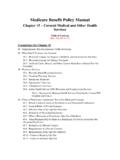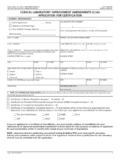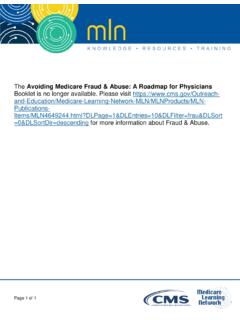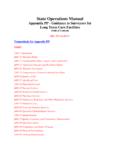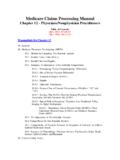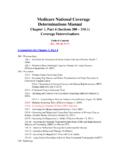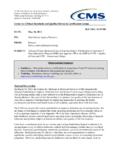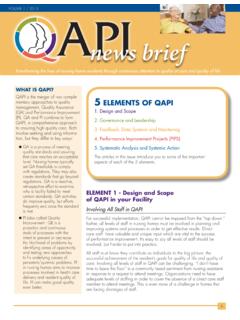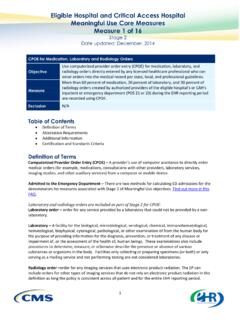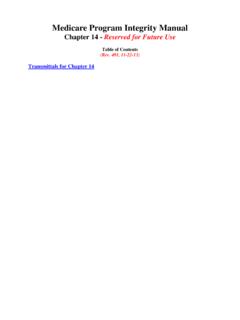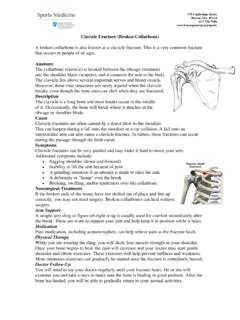Transcription of Developing Codes to Capture Post-Operative Care
1 I Research Report Developing Codes to Capture Post-Operative care Ateev Mehrotra, Courtney A. Gidengil, Lee H. Hilborne, Ashley M. Kranz, Stephanie Stratos, John N. Mafi, Barbara O. Wynn C O R P O R A T O N For more information on this publication, visit Library of Congress Control Number: XXXXXXXXXX ISBN: 978-0-8330-9541-1 Published by the RAND Corporation, Santa Monica, Calif. Copyright 2016 RAND Corporation R is a registered trademark. Limited Print and Electronic Distribution Rights This document and trademark(s) contained herein are protected by law. This representation of RAND intellectual property is provided for noncommercial use only. Unauthorized posting of this publication online is prohibited. Permission is given to duplicate this document for personal use only, as long as it is unaltered and complete.
2 Permission is required from RAND to reproduce, or reuse in another form, any of its research documents for commercial use. For information on reprint and linking permissions, please visit The RAND Corporation is a research organization that develops solutions to public policy challenges to help make communities throughout the world safer and more secure, healthier and more prosperous. RAND is nonprofit, nonpartisan, and committed to the public interest. RAND s publications do not necessarily reflect the opinions of its research clients and sponsors. Support RAND Make a tax-deductible charitable contribution at Preface The Centers for Medicare & Medicaid Services (CMS) uses the resource-based relative value system (RBRVS) to determine payment for physicians and nonphysician practitioners for their professional services.
3 The relative values for physician work measure the relative levels of professional time, effort, skill, and stress associated with providing services. For many surgeries and other types of procedures, Medicare payment also covers a bundle of Post-Operative visits delivered during a global period of 10 days or 90 days anchored on the surgery date. In the final rule for the 2015 physician fee schedule, CMS announced that all surgeries with a 10- or 90-day global period would transition to a 0-day global period in 2017 and 2018, respectively. Under this policy, physicians would bill separately for any Post-Operative visits after the day of surgery. CMS s rationale for scaling back global surgical packages was driven by concerns over the accuracy of the payment for Post-Operative care . In Section 523 of the Medicare Access and CHIP Reauthorization Act of 2015 (MACRA), Congress directed CMS not to transition all 10-day and 90-day global surgery packages to 0-day global periods (Public Law 114 10, 2015).
4 Instead, Congress mandated that CMS develop and implement a process to gather the necessary data to appropriately value Post-Operative care . Congress has required CMS to collect data on the number and level of visits in the global period from a representative sample of physicians beginning January 1, 2017. Congress suggested, but does not require, that the data be collected through claims. CMS asked the RAND Corporation to provide recommendations on how to best collect the number and level of Post-Operative visits through the use of nonpayment claims (recommendations on alternatives to nonpayment claims for data collection are outside the scope of this report). To do so, RAND gathered input from individual proceduralists and experts to describe the range of Post-Operative care provided during the global period.
5 In this report, we detail this background research and RAND s recommendations for a set of eight nonpayment Codes for Post-Operative care . The findings should be of interest to health policymakers, representatives of physician and nonphysician practitioner professional associations, and health services researchers. This study was funded by CMS under contract HHSM-500-2012-00163G with Chava Sheffield as project officer. This research was conducted in RAND Health, a division of the RAND Corporation. A profile of RAND Health, abstracts of its publications, and ordering information can be found at ii Table of Contents Preface .. iiTables.
6 ViiAcknowledgments ..ixAbbreviations ..xGlossary ..xi1. Introduction ..1 Background ..1 Project Objectives ..2 Organization of this Report ..3 Clarifications on Terminology ..32. Overview of Current Payment Policy for Post-Operative Services in the Global Period ..5 Process for Determining Valuation of Global Procedures ..5 Billing for Post-Operative Services Provided During the Global Interviews on Post-Operative Sampling Approach ..10 Interview of Interview Challenges Identified During Interviews and Expert Panel in Capturing Post-Operative care via Panel ..17 Challenges Identified During the Interviews and/or Expert of Challenges Associated with Capturing Post-Operative care ..235. Options for Capturing Post-Operative care ..24 Setting of E&M Codes ..24 Scope of care ..26 Time ..27 Summary of Options.
7 276. Recommendations for Capturing Post-Operative care ..28 Proposed Framework of Post-Operative Codes ..28 Inpatient Codes : A, B, and Visit Codes : D and for Non Face-to-Face care : F ..32 Codes for Clinical Staff: G and H ..33iii Choosing the Correct Time Increment ..33 Summary of Recommendations ..357. Summary and Next Steps ..36 Other Steps ..38iv Tables Table Characteristics of Interviews and Interviewees ..12 Table 2015 Global Surgical E&M Utilization Percentage by CPT code ..21 Table Visit Length Over Time from 1997 to 2012 for Medicare Patients ..34v Figure Figure Proposed Post-Operative Visit Codes ..29vi Summary The Centers for Medicare & Medicaid Services (CMS) uses the resource-based relative value system (RBRVS) to determine payment for physicians and nonphysician practitioners (NPPs) for their professional services.
8 The relative values for physician work measure the relative levels of professional time, effort, skill and stress, associated with providing services. For many surgeries and other types of procedures, Medicare payment also covers a bundle of Post-Operative visits delivered during a global period of 10 days or 90 days anchored on a surgery date. In the final rule for the 2015 physician fee schedule, CMS announced that all surgeries with a 10- or 90-day global period would transition to a 0-day global period in 2017 and 2018, respectively. Under this policy, physicians would bill separately for any Post-Operative visits after the day of surgery. CMS s rationale for scaling back global surgical packages was driven by concerns over the accuracy of the payment for Post-Operative care . In Section 523 of the Medicare Access and CHIP Reauthorization Act of 2015 (MACRA), Congress directed CMS not to transition all 10-day and 90-day global surgery packages to 0-day global periods (Public Law 114 10, 2015).
9 Instead, Congress mandated that CMS develop and implement a process to gather the necessary data to appropriately value Post-Operative care . Congress has required CMS to collect data on the number and level of visits in the global period from a representative sample of physicians beginning January 1, 2017. Congress suggested, but does not require, that the data be collected through claims. CMS asked the RAND Corporation to provide recommendations on how to best collect the number and level of Post-Operative visits through the use of nonpayment claims (recommendations on alternatives to nonpayment claims for data collection are outside the scope of this report). To do so, RAND first gathered input from individual proceduralists and later an expert panel to describe the range of Post-Operative care provided during the global period.
10 Interviewees described differences in Post-Operative care by type of procedure, care setting, geography, and patient, provider, and practice characteristics. Despite these differences, respondents did report some similarity in Post-Operative care delivered. For example, Post-Operative care included a set of similar tasks ( , taking history, reviewing vitals, checking wounds, managing pain). Most respondents also agreed that Post-Operative care in inpatient settings was more work than Post-Operative care in office-based settings. Both the interviews and the expert panel identified multiple challenges in capturing Post-Operative care , including: (1) who performs the work provided (proceduralist versus non proceduralist physician versus NPP versus clinical staff), as well as the heterogeneity of the work itself; (2) how to Capture practice expenses, such as staff time, space, equipment, and supplies; (3) how to Capture the variability in the complexity of Post-Operative care ; and (4) the need for a reporting system with a burden low enough so as not to discourage participation.
